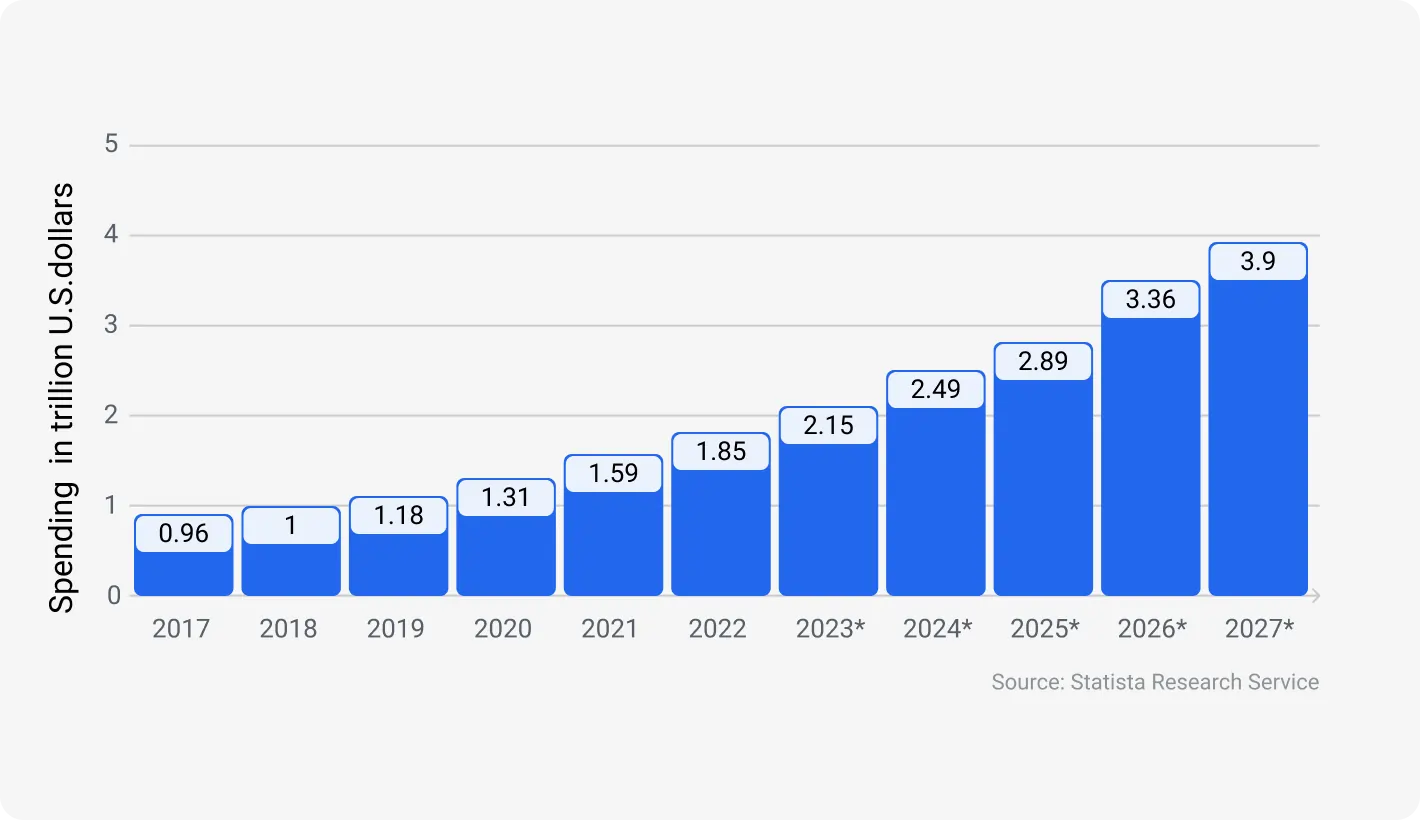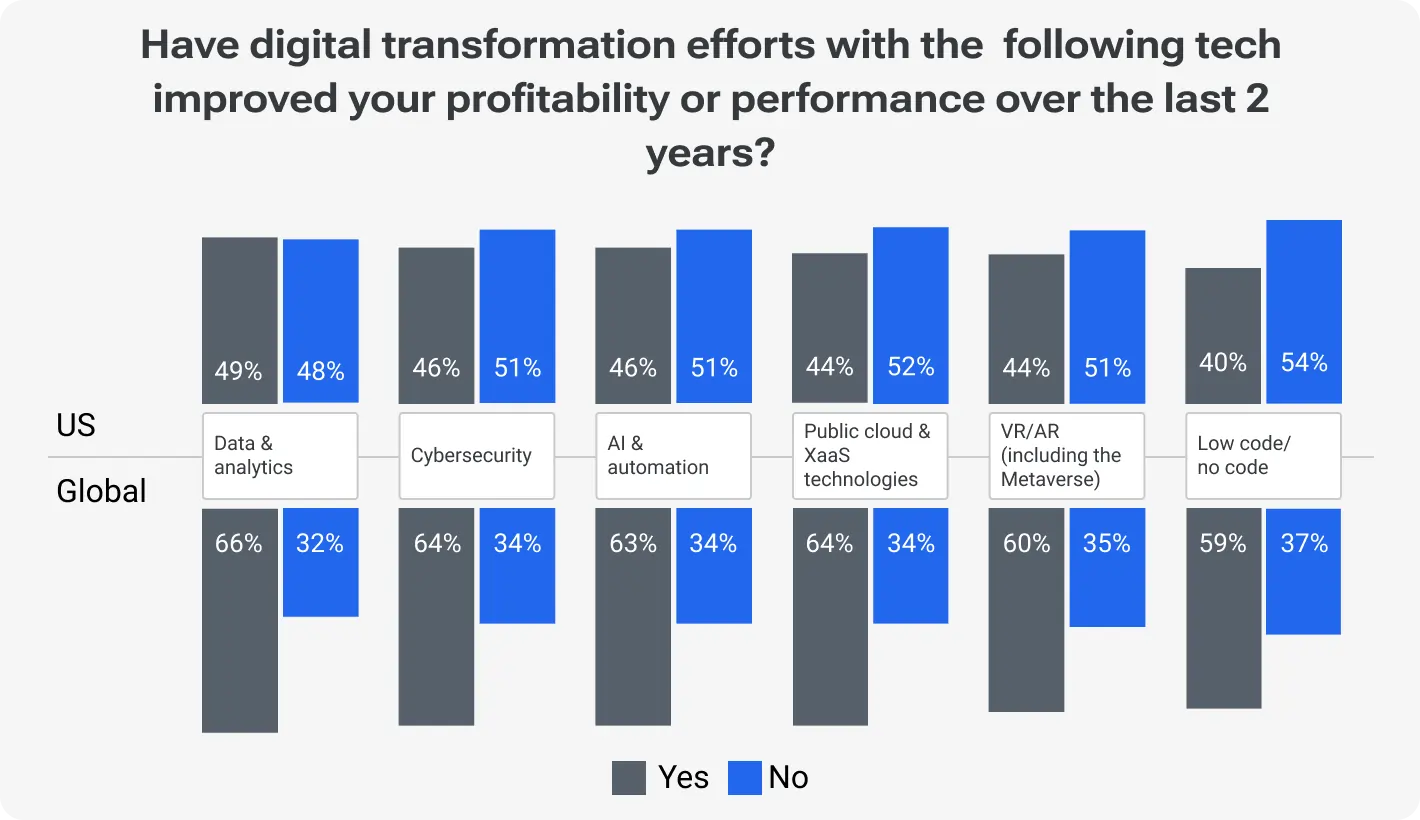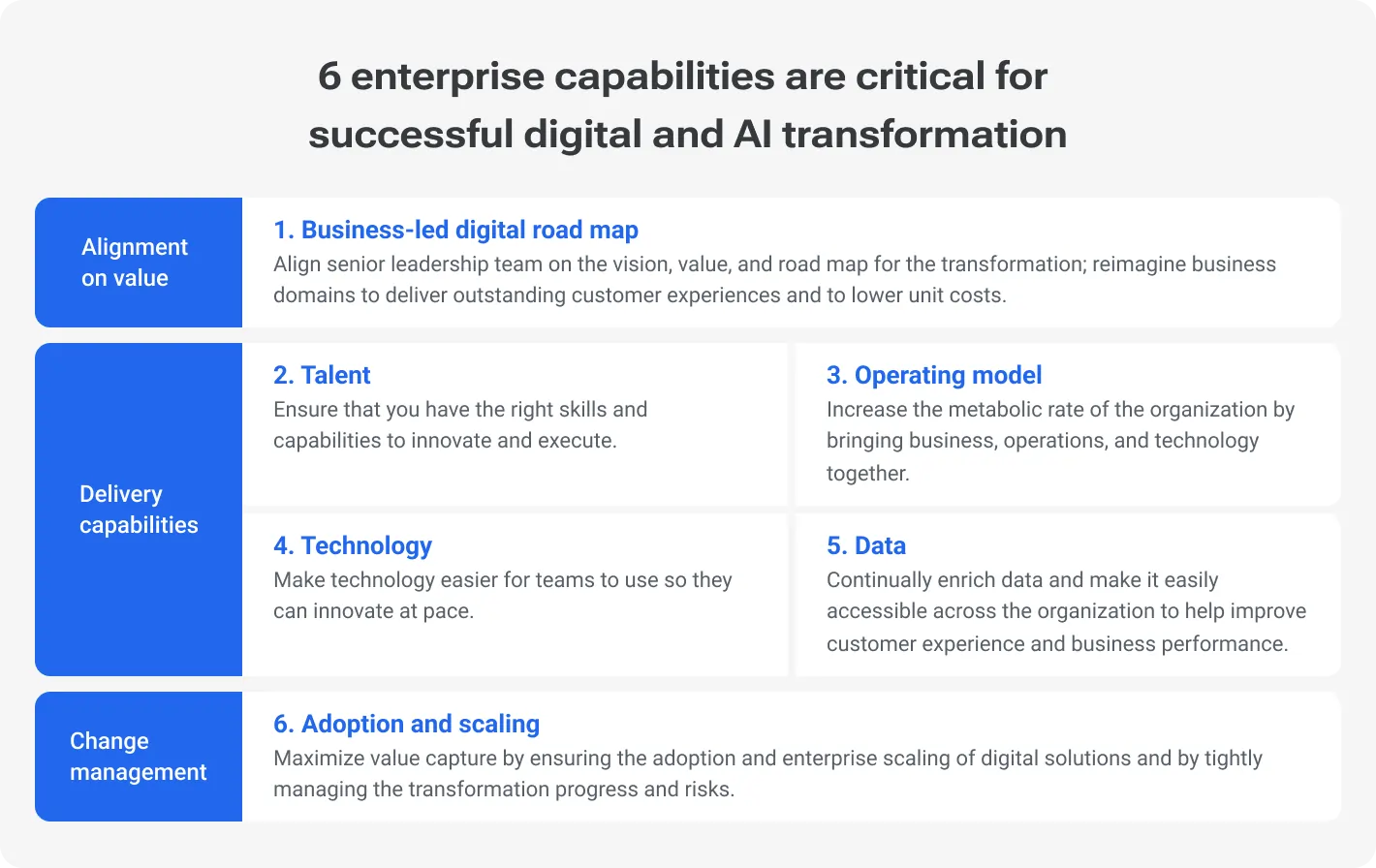Digital transformation alters company operations and consumer value delivery by strategically integrating digital technology. New efficiencies, innovative services, and reimagined consumer experiences are all possible because of the acceleration of this shift brought about by AI.
The amount spent on digital transformation globally will reach US$2.15 trillion in 2023. This suggests that more and more companies want to get more out of their business and are trying to keep up with the times. Just look at the graph below from Statista, which shows that this number will only grow in the future. However, digital transformation combined with AI offers even more benefits.
Learn how artificial intelligence facilitates this digital transformation, what it can do for your company, and how to use it in this comprehensive text.
The impact of AI implementation on digital transformation
The results of a KPMG CEO study from 2023 are shocking: 51% of US companies said their digital transformation efforts had no discernible effect on performance or profitability in the previous two years. We need to critically evaluate the practical advantages of digital technology in light of this finding, which undermines the current optimism.
Artificial Intelligence (AI) is a key driver in the digital transformation landscape, acting as a catalyst for innovation and business expansion. AI technologies such as machine learning, natural language processing, and computer vision are integral to enhancing digital transformation efforts across various industries. These technologies enable organizations to automate routine tasks, tailor customer interactions for enhanced engagement, and analyze large data sets to uncover actionable insights that can inform strategic decisions.
Many companies employ machine learning algorithms to optimize supply chain logistics, predict maintenance needs, and improve product recommendations. According to PwC’s 2024 Digital Trends in Operations Survey, 69% of supply chain and operations officers felt that their investments in technology did not yield the desired results, even though 70 percent of businesses had tried and used Generative AI. The difficulty of getting genuine outcomes from digital innovation is shown by this gap between expectations and reality.
Natural language processing is widely used in customer service to power chatbots that provide immediate, 24/7 assistance to customers. Additionally, computer vision is transforming the retail sector by enabling automated checkouts and enhancing security systems. These applications of AI not only streamline operations but also contribute significantly to business growth by improving efficiency and customer satisfaction.
Seamless digital transformation with 30% faster time to market and budget savings of up to 20%
Important considerations for digital transformation with AI
Let's take a look at what matters most when developing a plan to adopt AI.
-
Describe the problem. Make sure you know what you want the AI system to do for your company. To measure the efficacy of AI, set performance indicators and standards such as recall and accuracy.
-
Data quality and AI performance. The reliability of an AI system's predictions is dependent on the precision of the data readiness used to train it. For AI to make accurate conclusions, data must be accurate, exact, and relevant. To fix mistakes and discrepancies, data cleaning and preprocessing are crucial techniques. Gartner discovered that companies lose $15 million annually due to poor data quality, demonstrating how important it is to have high-quality data during AI implementation.
-
Choose the correct AI model. Think about the project's data type, problem complexity, and computational resources to choose an AI model that fits. The needs of the project should guide the model selection process because different models are better suited to different jobs.
-
Seamless system integration. Improve efficiency while reducing downtime by integrating AI with existing systems seamlessly. Make sure the AI's output helps the company's process.
-
Addressing ethical challenges. Make sure AI apps aren't biased, secretive, or unfair to address ethical concerns. Consider the larger social and environmental implications, especially in sensitive situations like talent acquisition. Companies that want to use AI responsibly can look to Google and IBM for examples of their ethics guidelines. A number of these standards stress the importance of AI systems being open, accountable, regulatory compliance, and fair.
These issues are crucial to establishing a strong AI strategy that matches with the company's strategic objectives and ethical norms.
Key steps for AI integration in digital transformation
If a company wants to boost operational efficiency and encourage innovation, it must incorporate AI into its digital transformation strategy. Nevertheless, meticulous preparation and execution are required to guarantee that the process is in line with business goals and produces measurable results.
These steps offer a systematic way to handle the intricate process of AI integration, starting from planning to deploying and monitoring on a large scale.
Step 1: Establishing overarching goals and determining use cases
The first step in digital transformation is to establish its overarching goals. Make sure these goals are in line with the company's overarching strategic objectives, like cutting costs, increasing efficiency, or satisfying customers better. A retail company, for instance, may want to use AI for more targeted marketing in the hopes of boosting sales and consumer engagement.
A good example is Nike. Launching mobile apps such as Nike+ and SNKRS, Nike effectively integrated AI into their digital evolution, leading to a 60% increase in online sales in 2020. These apps advanced Nike's digital-first strategy by improving the consumer experience and providing useful data insights.
Step 2: Analyzing and preparing data
For artificial intelligence to work, data must be available. Data cleaning is the first step in removing errors and discrepancies, while data exploration is the second step in understanding patterns and outliers. Because it entails picking the correct data attributes to train the AI models, feature engineering is crucial. For instance, by analyzing past transactions, a bank could train its fraud detection models to include characteristics that are more likely to indicate fraudulent activity. For example, to detect and prevent fraudulent transactions in real-time, JPMorgan Chase is developing a new system that uses artificial intelligence. To detect trends that might indicate fraud, this system is built to examine many datasets:
Transaction data. Examines each transaction in detail in search of irregularities that may indicate fraud.
Customer behavior. Analyzes past data to learn how each client typically makes purchases, which aids in spotting unusual behavior.
Device information. The device information is reviewed for indications of manipulation or connections from potentially dangerous areas.
The objective is to improve the system's accuracy via machine learning, which will allow it to react quickly to any fraud, safeguard consumer funds, and keep their confidence.
The role of big data in digital transformation
Step 3: Choose and develop a model
Pick AI models that are well-suited to your unique applications. What kind of data and problems are being addressed dictate this choice. Collaborative filtering models may be more suited for consumer recommendation systems, whereas regression techniques may be better for predictive maintenance. Put these models to work by utilizing appropriate AI frameworks and tools.
If you don't know which model development to lean towards, rely on our experts. Devico provides effortless transition to digital, with a 30% reduction in time to market and a 20% reduction in budget.
Step 4: System integration
Make AI solutions work in tandem with your current IT infrastructure requirements and processes. Part of this process is making sure AI tools can talk to older systems and work with them. Interfacing with Internet of Things (IoT) sensors and enterprise resource planning (ERP) systems, for instance, may be necessary to integrate an AI-driven analytics system in a manufacturing environment. This would improve real-time decision-making and streamline operations. Suntory PepsiCo leveraged AI technology to enhance their production quality checks, significantly improving efficiency and accuracy. By automating the monitoring of drink quality and detecting inconsistencies like filling levels and packaging defects in real-time, they have minimized waste and ensured high-quality products reach their customers.
Step 5: Evaluate and improve
Thoroughly test the AI models after development is complete to make sure they work as intended. To ensure the models are accurate and dependable, it is necessary to validate them against data sets that have not been seen before. Refine the models iteratively based on testing results to optimize performance. To better identify possible loan defaulters, an AI model used for banking credit scoring, for instance, could be continuously tested and improved.
Metrics like F1 score, accuracy, precision, and recall may be used to properly assess and enhance AI models. To make sure the model is still dependable and working as expected, it's a good idea to keep an eye on these metrics so you can evaluate it on fresh datasets. To reduce the number of false positives when detecting loan defaulters, an AI system for banking credit scoring, for instance, should prioritize accuracy. Optimization of the model's performance is achieved by continuous testing and iterative refining depending on these measurements. This leads to improved decision-making and operational efficiency, for example, improved customer service in banking with AI-powered biometrics.
The innovative use of AI-powered biometrics by NatWest, a major U.K. bank, has improved customer service by allowing customers to open accounts using a selfie. This technology streamlines and secures the account creation process by instantly matching selfies to official photo IDs. It was developed in collaboration with software partner HooYu.
Step 6: Rollout and continuous monitoring
Carefully plan the deployment of AI models into production to ensure they scale well and reliably perform under different conditions. Set up systems to keep tabs on how well AI apps are doing all the time. Any performance drift or anomalies can be detected earlier with this. For instance, for an AI system to swiftly adapt to new cyber threats, it may be necessary to constantly monitor it. This system is used for network security.
What really works when it comes to digital and AI transformations?
Future directions and advancements of AI for digital transformation
In the ever-changing world of digital transformation, artificial intelligence is leading the charge in bringing about major changes in various industries. The advent of cutting-edge technology is paving the way for massive changes in the way businesses operate. For instance, quantum AI has the potential to transform industries like cryptography and pharmaceuticals by solving complicated problems at a rate significantly faster than conventional computers.
Through process automation, improved decision-making, and the creation of new service paradigms, AI is set to profoundly integrate with and improve a wide range of industries in the future of digital transformation. Significant changes are predicted to be driven by breakthroughs in AI in the following major areas:
Autonomous operations. Operations in the Logistics, Transportation, and Manufacturing Sectors Are Anticipated to Be Even More Automated with the Help of AI. Autonomous cars and smart factories that use AI to manage intricate production processes are all part of this category.
Advanced personalization. Artificial intelligence (AI) will improve personalization in industries like retail and entertainment by making suggestions and providing material that is highly tailored to each user's tastes and habits.
Advanced data analytics. Artificial intelligence (AI) will be essential in helping companies make sense of their massive data sets, which will improve their strategic planning and operational efficiency.
AI in healthcare. Improved patient outcomes may result from quicker, more accurate diagnoses and more individualized treatment programs made possible by the growing use of artificial intelligence (AI) in healthcare settings, particularly in diagnostic procedures, customized medicine, and patient management systems.
Sustainable AI. To reduce the negative effects on the environment caused by training and operating massive AI models, there will be an effort to develop AI systems that use less computing power and are therefore more sustainable.
Ethical AI. As our dependence on AI grows, it is critical to make sure these systems are open, equitable, and responsible. Efforts to make AI judgments more interpretable and to minimize bias are part of this.
Integration with IoT and Edge Computing. A growing number of AI deployments will include internet of things (IoT) devices and edge computing to analyze data locally, improving the speed and reliability of AI applications while decreasing latency. By 2023, there will be more smart devices than people, according to Cisco's Annual Internet Report. These devices will all be streaming data that artificial intelligence can use to improve home energy systems and traffic flows in cities.
Another noteworthy development is the incorporation of AI into blockchain technology. This technology has the potential to greatly enhance smart contracts, making them more intelligent and flexible enough to handle intricate business agreements. As an example, companies such as IBM are at the forefront of initiatives that combine blockchain technology with artificial intelligence to improve supply chain transparency and combat fraud.
A PwC study estimates that artificial intelligence (AI) might add $15.7 trillion to the world economy by 2030, which bodes well for the expansion of AI-driven analytics. Included in this category are improvements to the customer experience and productivity gains from companies automating their processes.
Read our in-depth analysis in the blog post for more insights into the rapidly changing digital landscape and how these evolving technologies will reshape industries and influence future business strategies.
Conclusion
Your company can undergo a revolutionary change when you incorporate AI into your operations. This technology can revolutionize customer engagement, process optimization, and data exploitation for valuable insights. An integral part of any futuristic company plan, AI will only grow in importance as it paves the way for ever more inventive uses and greater efficiency.
Are you prepared to use AI to revolutionize your company? If you are interested in learning how our customized AI solutions can help advance your digital transformation efforts, contact Devico. To begin your transformation into an AI-driven business, visit our website or contact us directly.
Struggling to keep up with the competition due to outdated technology?






